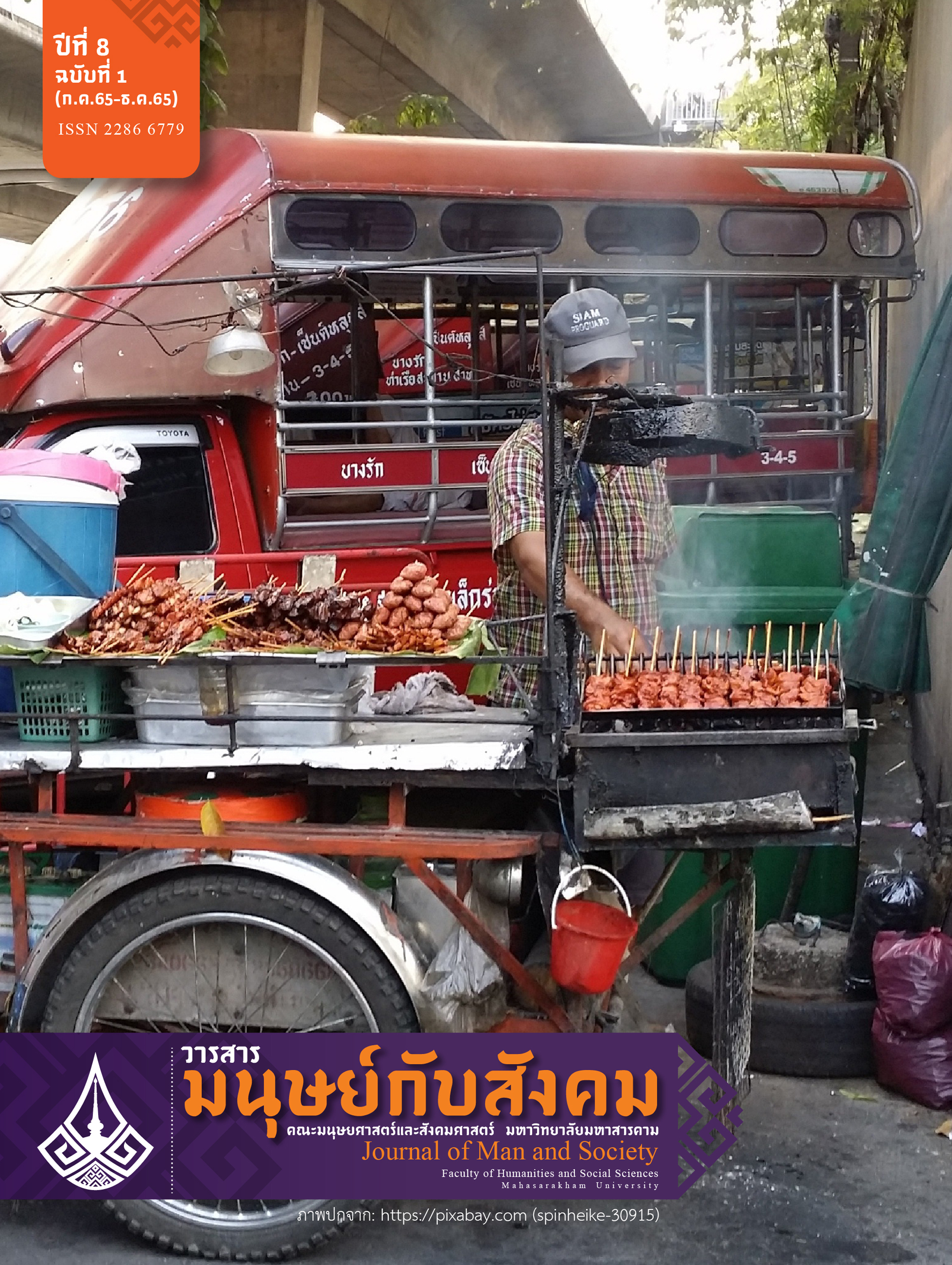แนวทางการเสริมสร้างศักยภาพเกษตรกรเข้าสู่การรับรองมาตรฐานเกษตรอินทรีย์แบบมีส่วนร่วมของเครือข่ายเกษตรอินทรีย์วิถีชัยภูมิ
Main Article Content
บทคัดย่อ
บทความนี้มีวัตถุประสงค์เพื่อศึกษาสภาพปัญหาและแนวทางการเสริมสร้างศักยภาพเกษตรกรเข้าสู่การรับรองมาตรฐานเกษตรอินทรีย์แบบมีส่วนร่วม (พีจีเอส) ของเครือข่ายเกษตรอินทรีย์วิถีชัยภูมิ ใช้รูปแบบการวิจัยเพื่อพัฒนา เทคนิคผสานวิธี ศึกษาเป็น 3 ระยะ ได้แก่ ระยะที่ 1 เป็นการสอบถามกลุ่มตัวอย่างเกษตรกร 108 คน ระยะที่ 2 เป็นการสัมภาษณ์ ระยะที่ 3 เป็นการสนทนากลุ่ม โดยกลุ่มเป้าหมายเป็นแบบเจาะจง คือ เกษตรกรและภาคีพัฒนา จำนวน 21 คน สถิติที่ใช้ในการวิเคราะห์ข้อมูลเชิงปริมาณ คือ สถิติร้อยละ ค่าเฉลี่ย และส่วนเบี่ยงเบนมาตรฐาน และข้อมูลเชิงคุณภาพใช้วิธีวิเคราะห์เนื้อหา ผลการวิจัยพบว่า สภาพปัญหาการเข้าสู่การรับรองมาตรฐาน จากการใช้แบบสอบถามโดยภาพรวมอยู่ในระดับน้อย คือ ( =2.19) ส่วนสภาพปัญหาปานกลางได้แก่ ข้อที่ 13 ( =2.80) ข้อที่ 8 ( =2.57) และข้อที่ 7 ( =2.51) บทเรียนและข้อเสนอแนะ พบความล่าช้าในการประกาศใช้พีจีเอสมาจากคณะทำงานมีความเห็นไม่ตรงกันในกติกาข้อ 1 จากการสัมภาษณ์พบข้อสงสัยต่อนิยามศัพท์และแนวทางปฏิบัติหลายข้อ สำหรับแนวทางการเสริมสร้างศักยภาพเกษตรกรให้แก้ไขนิยามศัพท์ข้อที่ 1 และปรับปรุงนิยามศัพท์เฉพาะ แนวปฏิบัติโดยภาพรวมให้หมดความสงสัย จัดทำคลิปวีดีโอ เร่งประกาศใช้พีจีเอส เร่งรับรองแปลง ประชาสัมพันธ์ ควรเสนอเป็นนโยบายสาธารณะ ผลกระทบจากการวิจัยได้เกิดการพัฒนาเกณฑ์เข้าสู่การรับรอง เกิดการยอมรับและประกาศใช้พีจีเอส ข้อเสนอแนะควรศึกษาการเลี้ยงสัตว์ด้วยระบบเกษตรอินทรีย์พื้นบ้านในเรื่องขอบเขตการใช้ยาปฏิชีวนะและสมุนไพร
Article Details

อนุญาตภายใต้เงื่อนไข Creative Commons Attribution-NonCommercial-NoDerivatives 4.0 International License.
เนื้อหาและข้อมูลที่ตีพิมพ์ลงในวารสารมนุษย์กับสังคม ถือเป็นข้อคิดเห็นและความรับผิดชอบโดยตรงของผู้เขียนซึ่งกองบรรณาธิการวารสารไม่จำเป็นต้องเห็นด้วยหรือร่วมรับผิดชอบใดๆ
บทความ ข้อมูล เนื้อหา รูปภาพ ฯลฯ ที่ได้รับการตีพิมพ์ในวารสารมนุษย์กับสังคม ถือเป็นลิขสิทธิ์ของวารสาร หากบุคคลหรือหน่วยงานใดต้องการนำทั้งหมดหรือส่วนหนึ่งส่วนใดไปเผยแพร่ต่อหรือเพื่่อกระทำการใดๆ จะต้องได้รับอนุญาตเป็นลายลักษณ์อักษรจากวารสารมนุษย์กับสังคมก่อน
เอกสารอ้างอิง
กองวิจัยและพัฒนาการจัดการที่ดิน กรมพัฒนาที่ดิน กระทรวงเกษตรและสหกรณ์. (2558). คู่มือแนวทางการรับรองเกษตรอินทรีย์แบบมีส่วนร่วม (พีจีเอส). [ออนไลน์]. ได้จาก: http://www.clinictech.most.go.th/online/filemanager/fileclinic/F1/files/pgs-manual.pdf [สืบค้นเมื่อ 27 สิงหาคม 2562]
กองโรคจากการประกอบอาชีพและสิ่งแวดล้อม. (2557). สถานการณ์ปัญหาโรคและภัยสุขภาพจากสารเคมีกำจัดศัตรูพืช. [ออนไลน์]. ได้จาก: http://envocc.ddc.moph.go.th/ contents/view/404 [สืบค้นเมื่อ 26 สิงหาคม 2562].
คณะกรรมการพัฒนาเกษตรอินทรีย์แห่งชาติ. (2560). ยุทธศาสตร์การพัฒนาเกษตรอินทรีย์แห่งชาติพ.ศ.2560-2564. [ออนไลน์]. ได้จาก: http://planning.dld.go.th/th/ images/stories/section-5/2560/strategy11.pdf [สืบค้นเมื่อ 26 สิงหาคม 2562].
ณรงค์ฤทธิ์ จันทร์นาหว่า และคณะ. (2561). กระบวนการพัฒนาและขับเคลื่อนธรรมนูญสุขภาพประเด็นสารเคมีเกษตร ตําบลนาดี อําเภอสุวรรณคูหา จังหวัดหนองบัวลําภู. หนองบัวลำภู: สำนักงานคณะกรรมการส่งเสริมวิทยาศาสตร์ วิจัย และนวัตกรรม.
บุญชม ศรีสะอาด. (2545). การวิจัยเบื้องต้น. พิมพ์ครั้งที่ 7. กรุงเทพฯ: สุวีริยาสาส์น.
วิสาหกิจชุมชนกลุ่มสมุนไพรอินทรีย์ตำบลท่ามะไฟหวาน. (2565). บันทึกปัจจัยการผลิต.
สวรรค์ มณีโชติ และดุสิต อธินุวัฒน์. (2562). การประยุกต์ใช้ระบบการรับรองแบบมีส่วนร่วมเพื่อส่งเสริมการเกษตรอินทรีย์ภายในชุมชนเกษตรกรรายย่อย. Thai Journal of Science and Technology, 8(5), 454-467.
สำราญ เชื้อเมืองพาน. (2558). การพัฒนาขีดความสามารถของกลุ่มเกษตรกรจังหวัดอุตรดิตถ์ในการผลิตข้าวอินทรียเพื่อสุขภาวะด้วยระบบควบคุมคุณภาพภายใน. วิทยานิพนธ์ปริญญาปรัชญาดุษฎีบัณฑิต สาขาวิชาสิ่งแวดล้อมศึกษา คณะวิทยาศาสตร์และเทคโนโลยี มหาวิทยาลัยราชภัฏอุตรดิตถ์.
Home, R., Bouagnimbeck H., Ugas, R., Arbenzand, M. and Stolze, M. (2018). Participatory guarantee systems: organic certification to empower farmers and strengthen communities. Research Institute of Organic Argriculture.


